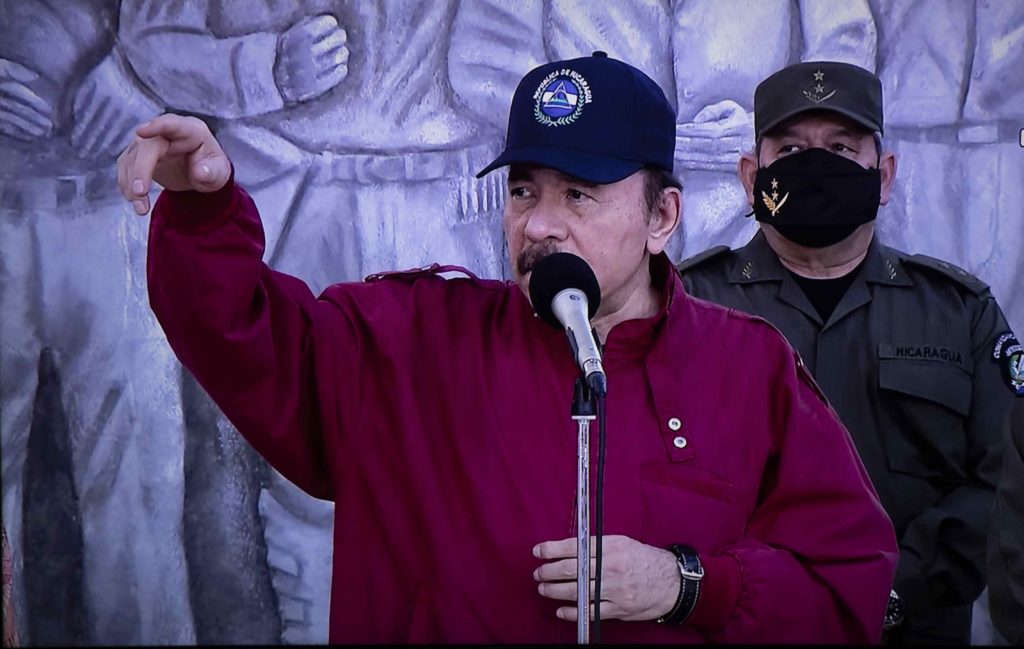In a forum held in Costa Rica in which three experts participated, it was stated that the most critical case on authoritarianism is Nicaragua, however, they noted that in El Salvador “an authoritarian regime has been configured under the veil of protection in the fight against gangs”, alongside Guatemala where the administration of justice is under the control of the “corrupt pact” (political and economic elite), and finally, in Honduras it has gone from the authoritarianism of former president Juan Orlando Hernández “to the nepotism of the Zelaya-Castro family”.
Text: Agencia EFE
Photography: Agencia EFE
Translated by: Amy Patricia Morales
Central America is undergoing a rise in authoritarianism, with the Nicaraguan government presided over by Daniel Ortega being “the most critical case,” three experts concluded on Thursday during a forum held in Costa Rica.
In the forum, titled “New authoritarianism in Central America, similarities and trends in the 21st century,” organized by the Center for Transdisciplinary Studies of Central America (Cetcam), the speakers concluded that in Nicaragua “a legal order has been established to criminalize the opposition and configure a totalitarian state”.
“The Nicaraguan reality is perhaps the most complex in the Central American region. The regime of Daniel Ortega and Rosario Murillo has consummated a totalitarian dictatorship that has tried, unsuccessfully, to eliminate any kind of formal and visible internal dissent, after the civic insurrection of 2018,” said Nicaraguan lawyer and researcher Juan Diego Barberena at the forum.
Barberena assured that in Nicaragua “the radicalization of Ortega’s exercise of political power has increased, unable to reestablish his political alliances which in the past were actors like private enterprise, which gave his political project a kind of stability”.
In the researcher’s opinion, since 2007, Ortega has advanced “in the constitution of a totalitarian state, dismantling organized opposition groups, crushing the prophetic voices of the Catholic Church, eliminating thousands of civil society organizations and consolidating his control over public institutions”.
Presidentialism over balance of power
Nicaraguan sociologist Elvira Cuadra agreed that “the most alarming case is Nicaragua,” where the couple rules with an iron fist.
In general, Cuadra said that Central America has reinforced presidentialism and centralization in the decision making process. She also said that there has been a rupture in the balance and institutional independence between the powers, “as a consequence of the strengthening of presidentialism.”
Furthermore, she added, societies have been “militarized” under the pretext of the coronavirus pandemic, in addition to insecurity and violence that prevail throughout the region.
On “militarism and militarization”, Cuadra, an expert on defense and security, stated that there has been a “resurgence of coercive and punitive security policies when responding to discontent, conflicts and social demands”.
In other words, she pointed out, the governments in the region are using force as a tactic “to contain discontent, conflicts and social mobilization” and have created the “legal frameworks to give preeminence to armed forces and coercive decisions”.
NGOs and human rights activists threatened in Central America
She also warned that “civil society organizations are threatened by the new authoritarianism” through the creation of legal frameworks that limit the right of association, the concealment of information, the instrumentalization of the judicial apparatus to persecute and control NGOs, and discourses that criminalize organizations and human rights defenders.
“Anyone who works towards building democracy is a victim of authoritarianism,” reasoned fellow researcher Katherine Ramirez, author of the report “Defenders Under Attack”.
According to Ramírez, activists in the region are victims of raids and confiscations, “express” detentions, harassment, defamation campaigns, banishment and forced exile, denationalization, judicial persecution, and selective assassinations.
“Authoritarian governments in the region seek to demobilize human rights defenders because they denounce abuses of power and represent a threat to their authoritarian projects,” he said.
Barberena insisted that Nicaragua, whose authorities aim to preserve political power, “is the country that has initiated these practices, and the other countries have joined in and perfected authoritarianism”.
In her study, she concluded that in El Salvador “an authoritarian regime has taken shape under the guise of a fight against gangs”, in Guatemala the administration of justice is under the control of the “corrupt pact” (political and economic elite), and in Honduras the authoritarianism of former president Juan Orlando Hernández “has been replaced by the nepotism of the Zelaya-Castro family”.






